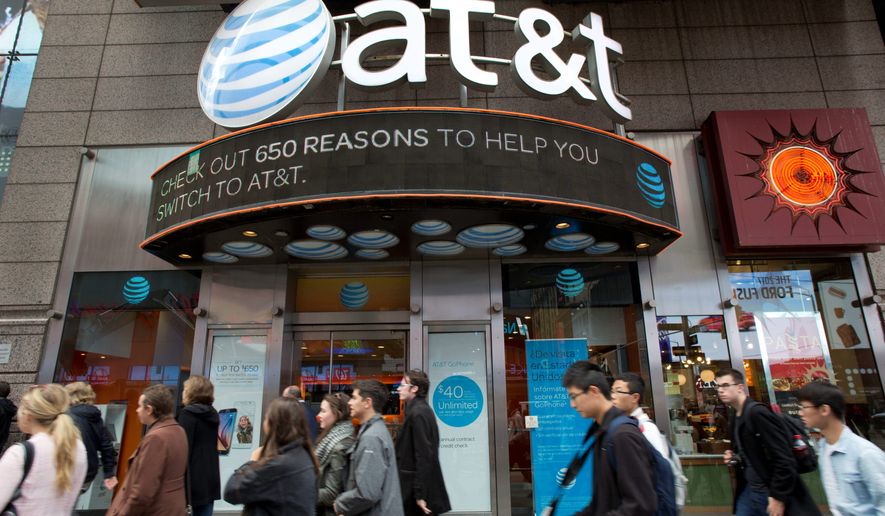The proposed AT&T merger with Time Warner has some conservatives nervous about its impact on free speech — namely theirs.
The prospect of another massive, left-tilting media conglomerate running both platforms and content — including Trump nemesis CNN — strikes trepidation in the hearts of right-wingers already feeling the squeeze from Google and Facebook.
“I think it’s pretty dangerous given that we’re looking at CNN being part of this merger,” said Rick Manning, president of Americans for Limited Government. “Consolidating CNN with DirecTV, which is in 26 million households, combined with the other outlets that exist in the context of that merger, you’re creating a pretty massive corporate profit motive for pushing eyeballs to CNN. And CNN has really ended any credibility they have as a news agency.”
At the same time, he said he would be opposed to the deal even if it didn’t mean increasing the clout of CNN.
“I’d still be against it because I think the single greatest challenge to the First Amendment is the consolidation of media,” Mr. Manning said. “In this modern world where speech is under attack on a daily basis from the left, when you consolidate media into mass corporate entities, they decide what’s valid speech and what’s not.”
Not all conservatives would agree. Wayne Crews, vice president for policy at the Competitive Enterprise Institute, said the right should stick to its free market guns.
“Conservatives should not be in the business of regulating the size of somebody’s microphone,” Mr. Crews said. “Conservatives are supposed to be in the business of saying, ‘Hey, especially in the internet age, everybody is a broadcaster on their own, and we can always create new microphones.’ And that’s exactly what we do.”
The Justice Department is weighing AT&T’s proposed $85.4 billion bid for Time Warner, which owns CNN, HBO and other television and media content, while AT&T has the nation’s largest pay-TV provider with DirecTV as well as mobile phone service.
A decision by the administration reportedly is expected before the end of the year, but President Trump made his views known during the 2016 campaign, calling it “too much concentration of power in the hands of too few.”
Since then Mr. Trump has said little about the proposed acquisition. Meanwhile, the administration’s lead on the merger, Justice Department antitrust chief Makan Delrahim, was confirmed by the Senate only three weeks ago.
“I’m concerned it may not go through the proper vetting process that would otherwise be in place,” said Jenny Beth Martin, president of Tea Party Patriots.
Former Ohio Secretary of State Kenneth Blackwell, a member of the Trump transition team, cited the merger’s potential for “hugely perilous effects on our news environment,” including political coverage.
“It’s not hard to see how AT&T could discriminate against other channels — including conservative voices — by putting them in a bad spot on your channel lineup and trying to make their shows hard to find,” Mr. Blackwell said in a Townhall.com column. “The AT&T/Time Warner combo could easily ensure that CNN is more accessible to consumers than competitors like Fox — to further increase CNN’s power to push their liberal agenda.”
He said the risk to small conservative channels like One America News and Newsmax is especially great, accusing DirecTV of agreeing to carry them in order to “buy off potential critics” of the merger.
The proposed acquisition has created a strange-bedfellows alliance between conservatives like Mr. Blackwell and liberals opposed to the creation of another corporate behemoth.
Ten of the Senate’s most liberal Democrats, along with Sen. Bernard Sanders, Vermont independent, have called on the Justice Department to reject the deal, citing the “substantial harms to competition and consumers.”
“We have strong concerns that the combined company’s unmatched control of popular content and the distribution of that content will lead to higher prices, fewer choices, and poorer quality services for Americans, substantial harms that cannot be remedied with unreliable, unenforceable and time-limited behavioral conditions,” they said in their June 21 letter.
Executives with AT&T and Time Warner have argued that the merger would increase choices for consumers by giving the companies more flexibility to react to market signals, compete with other cable companies more effectively and innovate in ways that benefit customers.
“Because this transaction will make us a more formidable competitor to cable, it’s going to increase competition,” said AT&T CEO Randall Stephenson in testimony before the Senate Judiciary Committee. “In fact, it would be a gross mistake to view this transaction as anything but pro-competitive.”
In his corner is tech entrepreneur Mark Cuban, who testified at the Dec. 7 hearing that the two companies need the merger in order not just to compete, but to survive against the tech giants that dominate media: Apple, Google, Microsoft, Amazon and Facebook.
Those five companies “present much if not all of their content algorithmically,” Mr. Cuban said. “At least with good old-fashioned TV, we get to pick the channels we want instead of having our feed tell us what we want.”
Mr. Manning said the solution isn’t to allow the formation of another media leviathan, but rather to take a hard look at whether the tech companies have become “so large and so dominant that they are in fact forming a cartel or monopoly on thought and what’s available to the public for viewership.”
“The last thing you want is for information flow to be so consolidated in the hands of a very few that you effectively have five, six, seven people, companies or CEOs controlling the information flow for 90 percent of the country,” Mr. Manning said. “That’s a dangerous situation. It’s dangerous for the left, it’s dangerous for the right, it’s dangerous for America. That’s why we’re opposed to it.”
• Valerie Richardson can be reached at vrichardson@washingtontimes.com.




Please read our comment policy before commenting.